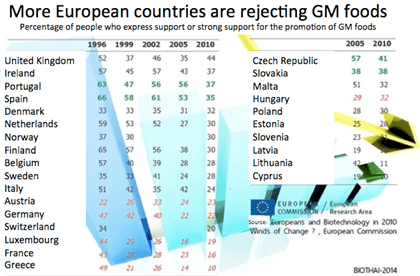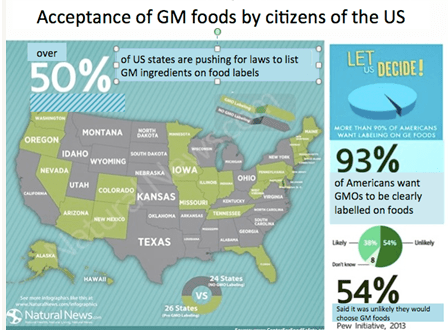
Up until 1 October 2015, member states of the European Union (EU) are entitled to notify the European Commission that they ban GM crops in their territories. According to the new regulation, each member state is allowed to restrict or prohibit the cultivation of GM crops, even those which have been approved by the health and environment assessment of the European Food Safety Authority (EFSA).
As we know, the new regulations of the EU, which were approved by an overwhelming majority (480 votes to 159, with 58 abstentions in the European Parliament), came about in response to widespread opposition in the EU to genetically-modified crops and foods. This flew in the face of expectations by corporate groups who had been pushing for GM crops, such as US-based groups Monsanto and DuPont, and the EU-based agrochemical giant, Syngenta.
Under the new regulation, member states of the EU have been declaring their ban of GMOs. The first to make such an announcement was the German government, followed by Scotland on 27 August 2015. Greece and Latvia have also declared they will exercise their right to ban the cultivation of GMOs. It is expected that before 1 October 2015, other member states of the European Union will declare an end to GM crop cultivation, including for example France, Luxembourg, Austria, Hungary, etc.
GMOs, or genetically modified organisms, are created by bringing the genes of a living organism which have specific genetic qualities into another living organism in order to obtain certain results, in particular to introduce toxic properties which can kill pests that eat the plant, or introduce resistance to the poisons which are used to control weeds, etc. The first GM crops were commercially grown in the US in 1996. However since that time, there has been a growing debate about GMOs throughout the world, including in Thailand. These have raised questions centering on concerns about the long-term impacts on health and the environment, as well as the problems of seed monopolisation, because there is only one company which controls 90% of the entire GM seeds market.
Many concerns over health problems have been raised. Prof Sheldon Krimsky from Tufts University in the US carried out a survey of research papers published in a range of high-quality peer-reviewed journals, from 2008 to 2014. He found 26 scientific research articles which reported test results that indicate a link between GM foods and negative health impacts in laboratory animals.
In addition, there are many problems of environmental and empirical health impacts. It has been found in the United States that the cultivation of GM crops have not led to any reduction in chemical weed control. The more GM crops were grown, the more it became necessary to spray toxic chemical pesticides, in particular the chemical glyphosate, which was recently concluded was a probable carcinogen to humans.
The movement to oppose GM crops and foods has been growing day by day rather than decreasing. For example a study by the European Commission, found that when comparing with the initial years when GM crops were first commercially grown and the last few years, it was found that while 66% of people in Spain used to support GMOs in 1996, in 2010 this percentage had fallen to only 35%. While 47% of people in Germany used to support GMOs, the number has plummeted to 22% only. In France also, where 43% of people used to support GMOs, support has fallen to 16%. This phenomenon is also becoming apparent in Eastern Europe in countries such as Hungary, Poland, Latvia etc. If Thailand decides to grow GMOs we should be aware that we are likely to lose out on export markets in Europe in the future.

It is interesting that opposition to GM foods is also growing in the United States, which was the birthplace of GMOs. Most Americans only became aware of GM crops 18 years after the government had allowed their cultivation. Polls carried out by different organisations found that more than 90% of Americans would like their government to impose GM labelling. Over half of respondents said that if they had the choice, or if they could tell from the label, it was unlikely they would choose produce that had been made from GM.
Legendary US recording artists such as Neil Young have even produced a new album dedicated to opposing GMOs. Several Hollywood stars such as Gwyneth Paltrow, Susan Sarandon, Daryl Hannah, Michael J. Fox, Elijah Wood, Danny DeVito, and fashion icons such as Vivienne Westwood, have all lent their support to the call for GM labelling.
The arguments in favour of and against GMOs are going on fiercely in the US, Europe and in Thailand. One side puts itself forward as technologically progressive, backed by one giant agrochemical company which sells GM seeds, while the other side is made up of consumers and people concerned about the impact on health and the environment, as well as concern for the long-term problems of monopolisation of the food and agricultural system.
It is worth examining the US experience, where people in different states, for example Maine, Connecticut, and Vermont, voted in a referendum in favour of GM labelling without waiting for a law from the federal government. Meanwhile, the food and seeds industries have responded together with the Agriculture Committee of the House of Representatives which has representatives of both the Democrat and the Republican parties (which general knowledge tells us both received vast amounts of money from the food and agricultural industries for their electoral campaigns) to push for a law called the Safe and Accurate Food Labelling Act of 2015, which will have the effect of annulling any existing or proposed legislation by different states to require GM labels in the same way as Europe. This law already passed the House of Representatives on 23 July 2015, but it will only come into force after it has been passed in the Senate and received the signature of President Obama. Consumer rights protection groups and other citizens are calling this act the DARK Act, referring to the acronym Denying Americans the Right to Know.
In the middle of this process, American consumers have turned their backs on foods which use GM produce and are beginning to support produce made with organics agriculture or products that have the GM free label. They have been putting heavy pressure on popular products from Cheerios, Similac and Chipotle products such that they no longer use GM ingredients in their food production. Starbucks and many other brands have become targets of campaigns to switch from using GM or products.

The food corporations may win in the U.S. Congress in the short-term, but in the market war, they can use their rights as consumers to choose to buy products which they demand and to teach the giant corporations the same lesson as they are being taught in Europe.
The market for organic agriculture products has grown significantly in the last 2 to 3 years. For example the market for organic products is now $35.5 billion – or more than 120 billion Baht – which represents a growth of 11.5% over the previous year. Similarly, products that have been labelled as GM free which are now worth $10 billion and this market is growing quickly.
The groups pushing for GMOs are putting pressure on Thailand to be the centre of GM production in the region. The United States and giant corporations together with lobby groups have been meeting with leaders of the country and have provided funding for Thai people to make study visits. They are pushing for Thailand to enact a law which facilitates the cultivation of GM. They have invited foreign resource persons to speak, who we found, in most cases, have links with the giant corporations with interests in GMOs.
Thailand is at a crossroads. Should we aim for the production of cheap agricultural goods on the tails of countries such as Argentina and Philippines who are following the US-led GM bandwagon, even though their citizens are increasingly mobilising to oppose GM products, or will we develop agro-ecological methods that are adaptable to changes in the economy and problems of health and environment which lie ahead.
Thailand does not have to follow the tails of anyone – we can use our own wits and strengths. We have a diverse biological resource base, we can build our agricultural and food system to be clean, safe, secure and sustainable. This will benefit both our small-scale farmers and consumers, and we will still be able to compete in every market around the world.
